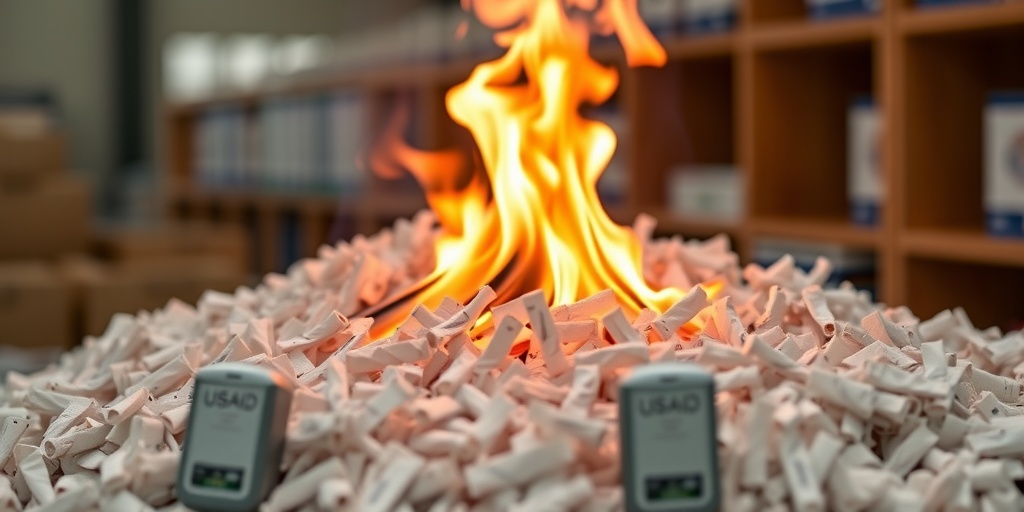Now Reading: USAID Orders Employees to Shred or Burn Classified Personnel Records
-
01
USAID Orders Employees to Shred or Burn Classified Personnel Records
USAID Orders Employees to Shred or Burn Classified Personnel Records

U.S. Agency for International Development Document Destruction Sparks Concerns
In a controversial move, a senior official from the U.S. Agency for International Development (U.S.A.I.D.) has directed staff to destroy classified documents and personnel files amidst ongoing dismantlement of the agency by the Trump administration. Erica Y. Carr, the acting executive secretary of U.S.A.I.D., sent an email instructing employees to shred classified documents and dispose of personnel files by either burning them or placing them in bags designated for that purpose. This directive was issued as part of a wider plan that has seen thousands of U.S.A.I.D. employees terminated, placed on paid leave, or directed to work from home, leading to a significant reduction in active staff at the agency’s Washington headquarters.
The email, which has come to light through reporting by The New York Times, has raised serious legal and ethical concerns about the potential destruction of records that may be crucial to several ongoing court cases involving the Trump administration and U.S.A.I.D. These cases stem from the mass firings and the abrupt relocation of employees, as well as the rapid dismantlement of U.S.A.I.D. and a freeze on foreign aid funding. According to the Federal Records Act of 1950, U.S. government officials are required to seek permission from the National Archives and Records Administration before destroying any documents. It remains unclear whether Ms. Carr and other officials have sought such approval before issuing their destruction orders.
The American Foreign Service Association (AFSA), a union that represents career diplomats, has expressed alarm over the reports regarding the destruction of sensitive documents. The union’s statement emphasized that federal laws mandate the preservation of government records to ensure transparency, accountability, and the integrity of the legal process. The AFSA also cautioned that employees involved in the improper destruction of records could face legal repercussions. This situation is particularly concerning given that many U.S.A.I.D. employees are career Foreign Service Officers who rely on these protections.
The act specifically mandates that agencies adhere to established retention schedules for government records, which covers both physical and electronic documents. Additionally, any physical documents slated for destruction must be saved in electronic format prior to disposal. However, it remains uncertain whether U.S.A.I.D. employees ensured compliance with these federal regulations before initiating the destruction of documents. Ms. Carr’s email further instructed employees to convene at the Ronald Reagan Building, the current headquarters of U.S.A.I.D., at 9:30 a.m. to participate in the document disposal.
The context underlined by these developments is further complicated by the Trump administration’s broader strategy of diminishing the role of U.S.A.I.D. in international aid. Secretary of State Marco Rubio, who has recently taken charge of U.S.A.I.D., confirmed the cancellation of around 83% of the agency’s contracts, equating to roughly 5,200, with only 1,000 remaining contracts to be handled by the State Department. The degree of this reduction in contracts, coupled with the immediate termination of personnel, raises serious questions about the future of U.S. foreign aid and the responsibilities of the agency.
A federal judge recently ruled against the administration’s halt of aid payments, ordering that the government must restart aid funding for work that had already been completed, highlighting Congress’s appropriated funds and the administration’s inability to “impound” the money. This ongoing legal landscape adds an additional layer of complexity to the situation, particularly as it pertains to the preservation of documents that could serve as critical evidence in these cases.
As the ramifications of these document destruction orders unfold, employees and officials within U.S.A.I.D. navigate a precarious environment, balancing compliance with federal laws against the directives issued from the top. The destruction of classified documents could undermine legal accountability and hinder transparency within the government, emphasizing the importance of adhering to established federal regulations regarding record preservation.
In the coming weeks, as the investigation into the actions taken by U.S.A.I.D. and the broader implications of the Trump administration’s policies continue, it will be crucial for both the government and its employees to uphold their commitment to accountability and transparency, ensuring that the rights of affected employees are respected and protected.
Ryan Mac contributed reporting from Los Angeles.
Stay Informed With the Latest & Most Important News
Previous Post
Next Post
-
 01New technology breakthrough has everyone talking right now
01New technology breakthrough has everyone talking right now -
 02Unbelievable life hack everyone needs to try today
02Unbelievable life hack everyone needs to try today -
 03Fascinating discovery found buried deep beneath the ocean
03Fascinating discovery found buried deep beneath the ocean -
 04Man invents genius device that solves everyday problems
04Man invents genius device that solves everyday problems -
 05Shocking discovery that changes what we know forever
05Shocking discovery that changes what we know forever -
 06Internet goes wild over celebrity’s unexpected fashion choice
06Internet goes wild over celebrity’s unexpected fashion choice -
 07Rare animal sighting stuns scientists and wildlife lovers
07Rare animal sighting stuns scientists and wildlife lovers




















